Middle East
Second night of protests in Turkiye after Istanbul mayor detained | Courts News
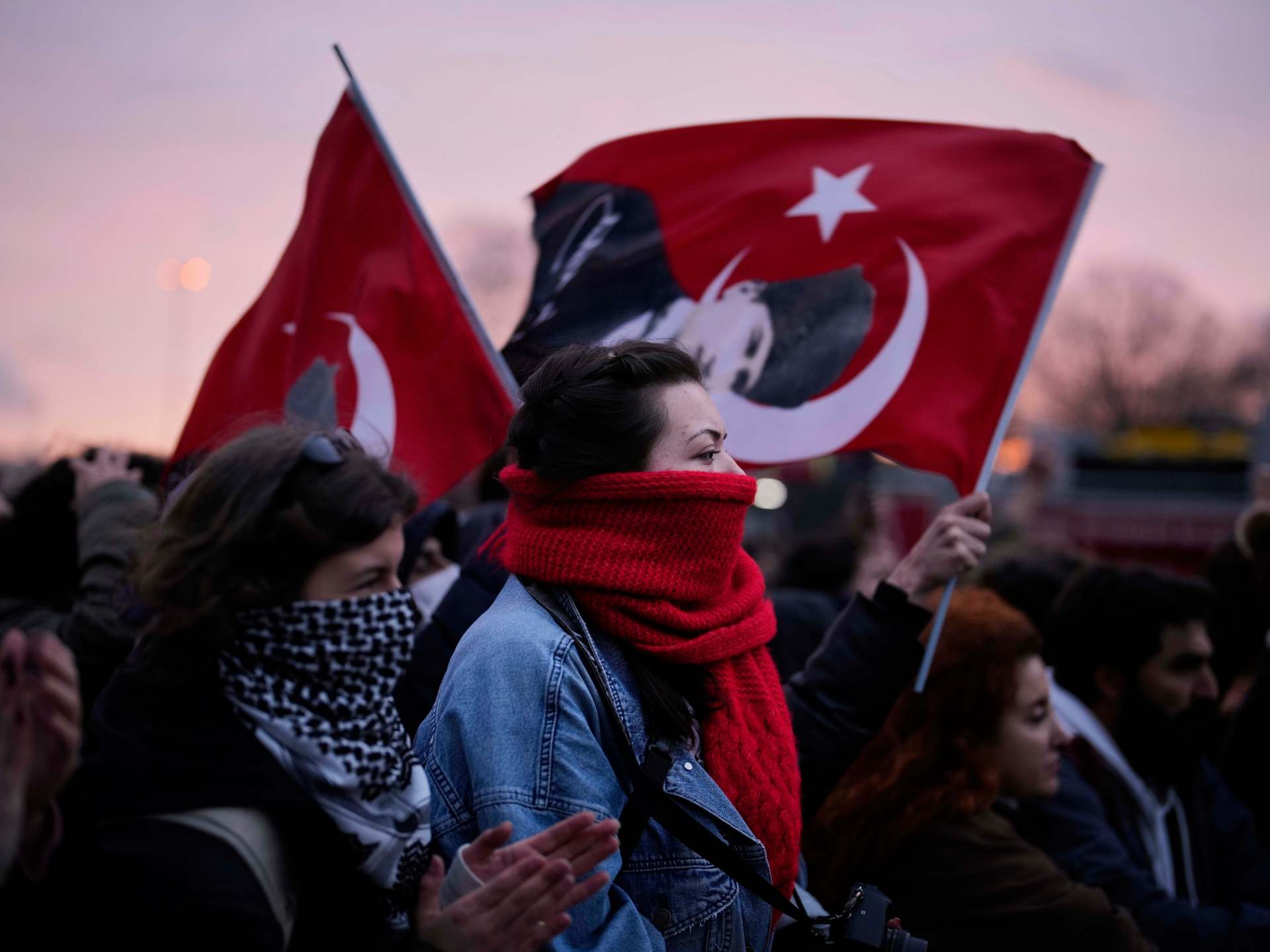
Predawn arrest of Mayor Ekrem Imamoglu sets off protests in several cities that are likely to continue into the weekend.
Turkish protesters took to the streets for a second consecutive night following the arrest of Istanbul Mayor Ekrem Imamoglu as part of a separate corruption and terrorism investigation.
Demonstrations were held at Istanbul’s City Hall on Thursday, where small groups of protesters scuffled with police as they tried to approach the city’s fenced-off Taksim Square – the site of mass demonstrations in 2013.
In Ankara, the Turkish capital, police used water cannon to disperse crowds at Middle East Technical University. Smaller protests were also reported in the city of Izmir, on the Turkish coast, and Adana, in southern Turkiye.
The mayor was arrested in a predawn raid on Wednesday, just days before he was due to announce his run for the presidency in 2028 as an opposition candidate. Also detained were dozens of prominent figures, including journalists, businesspeople and staff members of the Istanbul municipal government.

Imamoglu is a member of the secular Republican People’s Party (CHP) and is considered one of the top rivals of Turkish President Recep Tayyip Erdogan.
He faces multiple charges, including “bribery, extortion, corruption, aggravated fraud, and illegally obtaining personal data for profit as part of a criminal organisation”, along with separate charges for allegedly collaborating with the Kurdistan Workers’ Party (PKK) in municipal elections.
The PKK is designated as a “terrorist organisation” in Turkiye and is behind a long-running rebellion aimed at creating an independent Kurdistan.
Earlier this week, a Turkish university nullified Imamoglu’s diploma for “irregularities”, a move that could see him banned from politics. The charges add to a growing list of legal probes against the mayor, some dating back to 2022.
The protests, triggered by Imamoglu’s detention, appear set to continue into the weekend despite a four-day ban imposed by the government.
Addressing a rally outside Istanbul’s City Hall on Thursday evening, CHP leader Ozgur Ozel called on supporters to continue demonstrating.
“Yes, I am calling the people to the streets,” he said, urging them not to resort to violence.
Some have also taken to social media to air their grievances, sharing 18.6 million posts within 24 hours of Imamoglu’s detention, according to Interior Minister Ali Yerlikaya. Among them, 261 social media accounts were deemed to be “inciting” public hatred or crime, leading police to detain 37 suspected account users, he said.

Turkish market trading has also been hit by the surprise arrest. Trading was temporarily halted on Wednesday to prevent panic selling, while the lira fell to a record low.
Despite the turmoil, President Erdogan and his ruling Justice and Development Party have continued to defend Imamoglu’s detention.
Omer Celik, the party’s spokesperson, urged the opposition to respect the legal process.
“What a politician should do is follow the judicial process,” Celik told the media. “None of us have any information about the content of the [criminal] file.”
Middle East
Thousands gather for centuries-old Holy Fire ceremony in Jerusalem | Jerusalem News
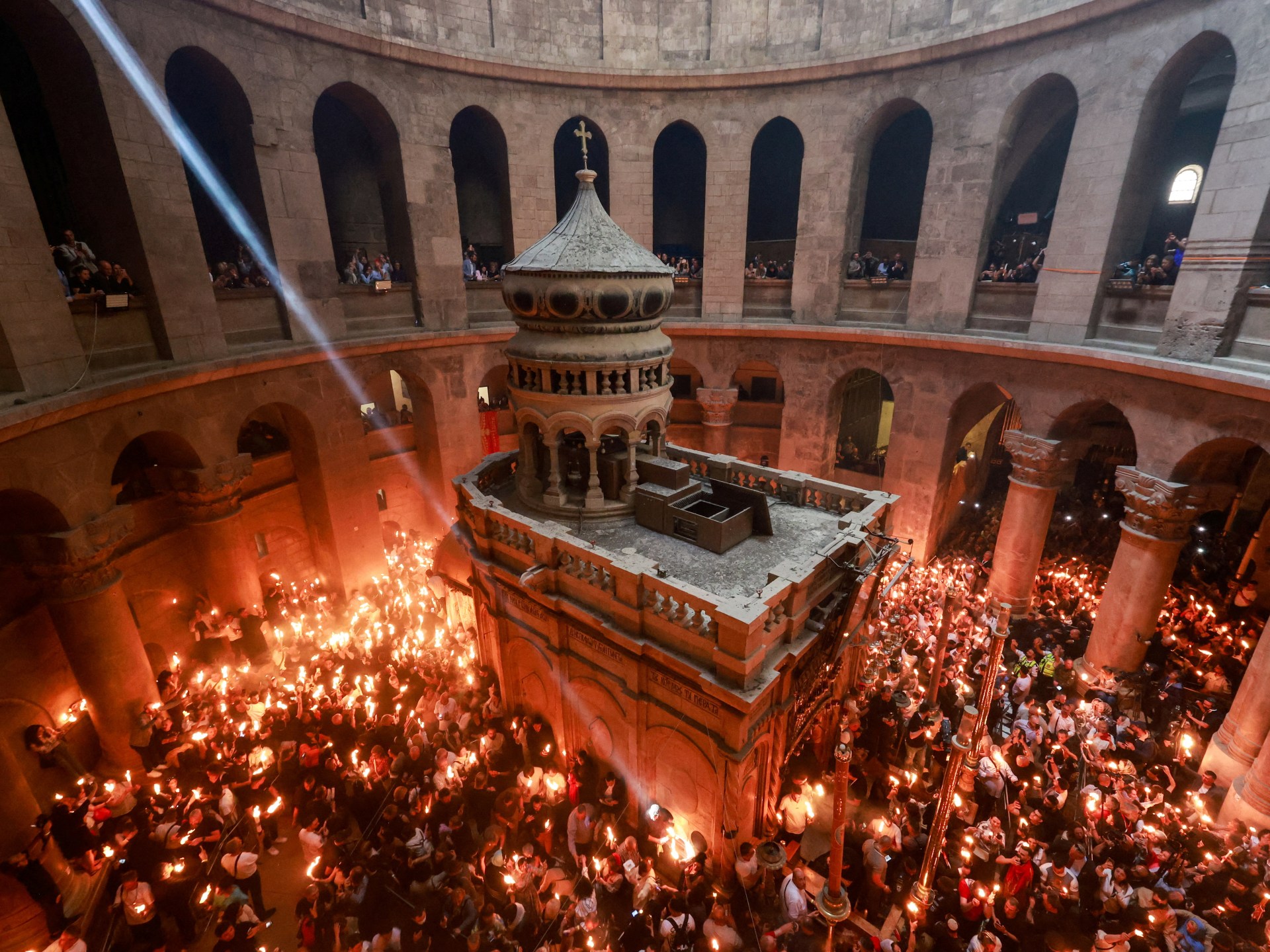
Thousands of Christians gathered in the cavernous Church of the Holy Sepulchre for a centuries-old Holy Fire ceremony.
Holding unlit candles, they packed into the sprawling 12th-century basilica built on the site where, according to tradition, Jesus was crucified and buried.
In near-total darkness, the Greek patriarch entered the Holy Edicule and emerged with two lit candles. The flame was passed from one candle to the next, the light overcoming the darkness in the rotunda. The flame was later transferred to Orthodox communities in other countries on special flights.
Eastern Orthodox Christians believe the light miraculously appears inside the Holy Edicule, built on the traditional site of Jesus’s tomb, while sceptics going back to the Middle Ages have dismissed it as a carnival trick for the masses.
Either way, the ceremony, which goes back at least 1,200 years, is a sight to behold. It has also ignited safety concerns.
In 1834, a frenzied stampede broke out in the darkened church, and the ruler of the Holy Land at the time barely escaped after his guards drew swords and hacked their way through the crowd, historian Simon Sebag Montefiore recounts in his history of Jerusalem. Some 400 pilgrims died in the melee, most from suffocation or trampling.
Israeli authorities have sought to limit participants in recent years, citing safety concerns. That has drawn protests from church leaders, who have accused them of upsetting the delicate, unwritten arrangements around Jerusalem’s holy sites known as the status quo.
On Saturday, there was a heavy military presence as thousands of worshippers passed through Israeli checkpoints to enter.
Some worshippers lamented that the turnout lacked numbers this year because of Israel’s 18-month war on Gaza. “The number of police is higher than the number of pilgrims,” said Adeeb Joude, key holder for the Holy Sepulchre.
Israel captured East Jerusalem, including the Old City with major sites sacred to Jews, Christians and Muslims, in the 1967 Middle East War, and annexed it in a move not recognised internationally. The Palestinians want East Jerusalem to be the capital of their future state.
The Old City has a long history of tensions between Israelis and Palestinians, among different religious groups that share its hilly confines and even within certain faiths. Perceived infringements on the status quo in the Church of the Holy Sepulchre have led to brawls between monks of different denominations.
Israel says it is committed to ensuring freedom of worship for Jews, Christians and Muslims, and has long presented itself as an island of tolerance in the Middle East.
In recent years, however, tensions have risen with the local Christian community, most of whom are Palestinian Christians, a population that has dwindled through decades of conflict as many have moved abroad.
Middle East
US attacks Yemen again after at least 80 people killed in Hodeidah | Israel-Palestine conflict News
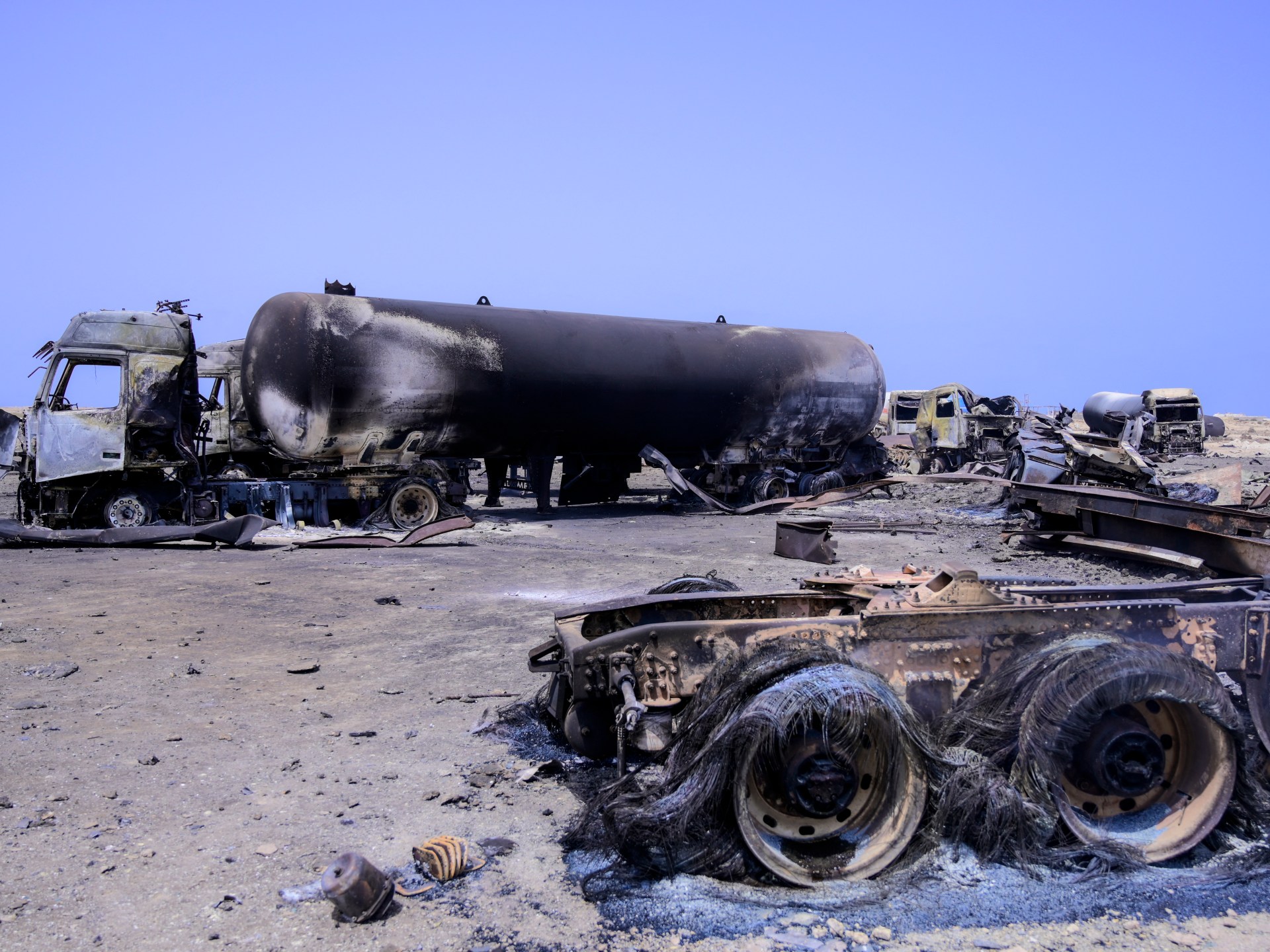
UN chief Antonio Guterres says he is ‘gravely concerned’ about US air strikes this week on Yemen.
The United States has carried out 13 air strikes on Hodeidah’s port and airport, the Houthi-affiliated TV channel Al Masirah says, two days after a US air strike targeted the Ras Isa port, also in Hodeidah, killing at least 80 people and wounding more than 150.
Al Masirah also reported Saturday that three people were killed and four injured due to a US attack on al-Thawra, Bani Matar, and al-Safiah districts in the capital Sanaa.
The Houthis have promised to carry out “more operations” despite the ongoing US attacks.
US President Donald Trump’s administration announced a major military offensive against the Houthis a few weeks ago. It said the air strikes are aimed at forcing the Houthis to stop threatening ships sailing on the Red Sea on a route crucial to international trade.
Since November 2023, the group has reportedly launched more than 100 attacks on vessels it says are linked to Israel in response to Israel’s war on Gaza and in solidarity with Palestinians.
On Friday, Houthi official Mohammed Nasser al-Atifi told Al Masirah that the “American enemy’s crimes” will not deter the Yemeni people from supporting Gaza, but “rather will strengthen their steadfastness and resilience”.
The Houthis, also known as Ansar Allah or “supporters of God”, are an armed group that controls most parts of Yemen, including Sanaa. The group emerged in the 1990s but rose to prominence in 2014 when it seized Sanaa and forced President Abd-Rabbu Mansour Hadi to flee the country.
United Nations Secretary-General Antonio Guterres “is gravely concerned about the airstrikes conducted by the United States over the course of 17 and 18 April in and around Yemen’s port of Ra’s Isa, which reportedly resulted in scores of civilian casualties, including five humanitarian workers injured,” Guterres spokesman Stephane Dujarric said in a statement on Saturday.
Guterres expressed fears of damage to the port and “possible oil leaks into the Red Sea”, Dujarric added.
The strikes on Ras Isa aimed to cut off supplies and funds for the Houthis, the US military said. It was the deadliest attack of Washington’s 15-month campaign against the Iran-aligned group.
About 70 percent of Yemen’s imports and 80 percent of its humanitarian assistance pass through the ports of Ras Isa, Hodeidah and as-Salif.
Ras Isa also is the terminus of Yemen’s main oil pipeline, which, along with its port, are “critical and irreplaceable infrastructure” in Yemen, according to the UN Development Programme.
Middle East
Iran says progress in nuclear talks with US, confirms third round next week | News
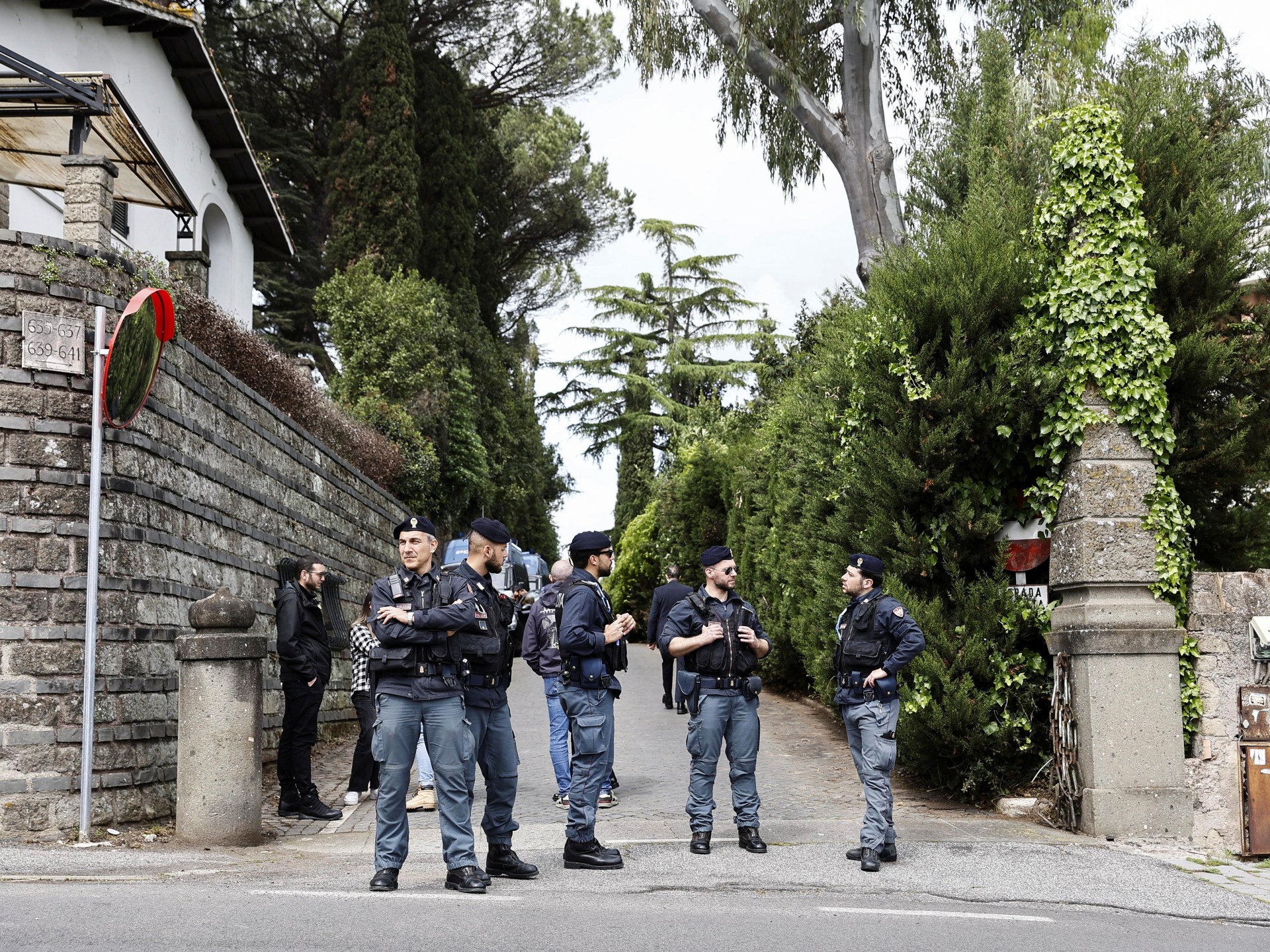
After technical talks, senior negotiators expected to reunite on April 26, according to Iran’s foreign ministry.
Iran and the United States have completed a second round of indirect nuclear negotiations, which Iran’s foreign minister has described as “constructive” and moving forward with further meetings planned in the coming week.
Abbas Araghchi and US Middle East envoy Steve Witkoff held four hours of indirect talks at Oman’s embassy in the Italian capital, Rome, on Saturday, according to Araghchi.
“We succeeded in reaching a better understanding on certain principles and goals,” the diplomat was quoted by the semiofficial Tasnim news agency as saying. “The negotiations were conducted in a constructive atmosphere and are progressing.”
There has been no readout yet of the meeting from the US side.
The delegations – led by Araghchi and Witkoff, a billionaire real estate executive whom US President Donald Trump has dispatched on numerous foreign policy missions – stayed in separate rooms in the embassy as Omani Foreign Minister Badr al-Busaidi shuttled messages between them, according to Iranian officials.
Iran’s Ministry of Foreign Affairs said the parties will hold more indirect, technical-level talks in the coming days, followed by another meeting with senior officials on April 26.
There were useful indirect talks today between Iran and the United States conducted by Oman Foreign Minister in a constructive atmosphere.
The two sides agreed to continue the indirect talks in few days at technical level to be followed by another round at their own level on…
— Esmaeil Baqaei (@IRIMFA_SPOX) April 19, 2025
“I hope that after next week’s technical sessions, we’ll be in a better position,” Araghchi said, according to Tasnim. “There’s no reason for excessive optimism or pessimism.”
‘Negotiations to pick up’
Al Jazeera’s James Bays, reporting near the Omani diplomatic compound in Rome, said the Iranian response was “very positive” for a delegation that “had seemed pretty negative going into the talks”.
Next week’s planned talks mean “the pace of negotiations is going to be picked up”, Bays said.
The latest meeting comes a week after Iran and the US came together in Muscat for their first high-level discussions since Trump in 2018 unilaterally abandoned a landmark nuclear accord signed and brokered by world powers in 2015.
The Iranians “are looking for a kind of consistency when it comes to the current talks”, Al Jazeera’s Tohid Asadi reported from Tehran.
Will US accept civilian nuclear programme?
Western governments, including the US, have long accused Iran of seeking to develop nuclear weapons – an allegation Tehran has denied, insisting its nuclear programme is solely for peaceful civilian use. On Wednesday, the head of the International Atomic Energy Agency, Rafael Grossi, said Iran was “not far” from possessing a nuclear weapon.
Grossi was also in Rome on Saturday meeting Italian Foreign Minister Antonio Tajani. Grossi’s nuclear watchdog would likely be central in verifying compliance by Iran should a deal be reached, as it did with the 2015 accord.
The US and Iran have had no diplomatic relations since shortly after Iran’s 1979 Islamic Revolution. After returning to office in January, Trump revived his “maximum pressure” sanctions campaign against Tehran, but in March, he sent a letter to Iranian Supreme Leader Ali Khamenei calling for renewed negotiations – while warning of military consequences if diplomacy fails.
“I’m not in a rush” to use force, Trump said on Thursday. “I think Iran wants to talk.”
On Friday, Araghchi said the US showed “a degree of seriousness” during the first round of talks but questioned Washington’s “intentions and motivations”.
Bays said the heart of the dispute remains whether Iran may maintain a civilian nuclear programme – or whether, as hardliners in Washington insist, it must dismantle its nuclear programme entirely.
“All they’ve been talking about last week in Muscat and here in Rome is a framework for the discussions and what they want to achieve,” Bays said. “They have not been discussing the nuclear detail, … and the devil is in the detail on these things.”
-

 Education2 days ago
Education2 days agoHarvard’s battle with the Trump administration is creating a thorny financial situation
-

 Sports2 days ago
Sports2 days agoClint Dempsey speaks to CNN over his concerns over the USMNT heading into its home World Cup
-
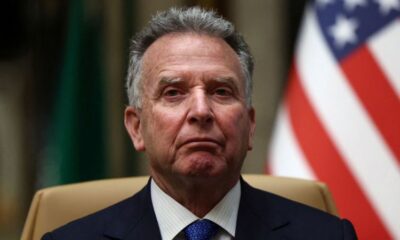
 Europe2 days ago
Europe2 days agoTrump’s ‘lone ranger’: How Steve Witkoff became the defacto point man on America’s foreign policy challenges
-
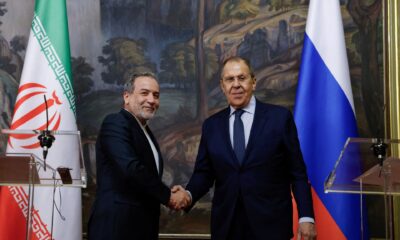
 Conflict Zones2 days ago
Conflict Zones2 days agoIran has ‘doubts’ about US intentions ahead of nuclear talks | Politics News
-
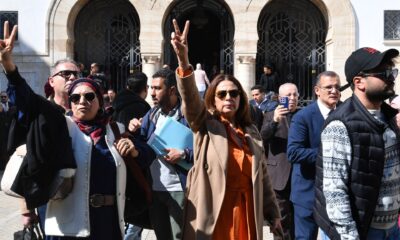
 Middle East1 day ago
Middle East1 day agoTunisian court hands opposition figures lengthy jail terms | Human Rights News
-
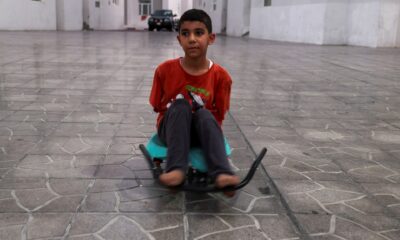
 Conflict Zones2 days ago
Conflict Zones2 days ago‘How do I live like this?’ asks Gaza boy who lost arms in Israeli attack | Gaza News
-

 Conflict Zones2 days ago
Conflict Zones2 days agoTrump says US may ‘pass’ on helping end war if Russia, Ukraine resist deal | Russia-Ukraine war News
-
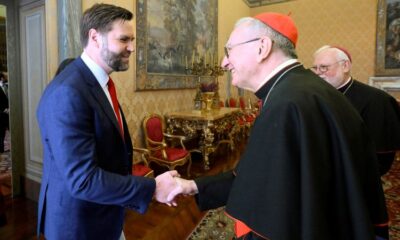
 Europe1 day ago
Europe1 day agoVance, Vatican officials engage in ‘exchange of opinions’ over migrants




